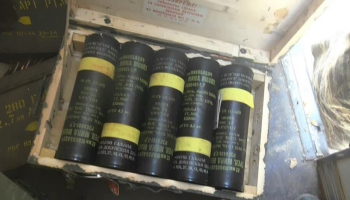The report, entitled, “Guns, Planes and Ships: Identification and Disruption of Clandestine Arms Transfers,” outlines a new Arms Transfer Profiling and Indicator System (ATPIS) run by a UK-based non-profit (atpis.org) of the same name. Law enforcement, customs and transportation control officials log onto ATPIS and enter the name of an airline, the destination and other information. The system then takes these into account and gives the transaction a color coding, ranging from red (highly suspect), to amber (partially suspect) or green (not suspect).
The system should be fully operational by the end of the year.
The report also contains case studies of arms brokers and transporters operating from the Balkans, the Caucasus, Russia, and various Middle Eastern, African and European Union countries. Balkans arms traffickers involved in illicit shipments to Africa, the report maintains, have become heavily involved in legitimate arms and ammunition transfers to Iraq and elsewhere.
Tomislav Damjanovic, for example, is a Serbian businessman whose airlines over the years have been reported to fly contraband including smuggled cigarettes and weapons for countries under UN sanctions. He then turned to doing contract business for the U.S. Department of Defense, shipping weapons for fledgling security forces in Afghanistan and Iraq.
Documents in the report show that different companies Damjanovic ran or managed had flown arms to countries and regions under UN sanctions. In 2002, a Damjanovic company flew a consignment of AK-47s, rocket launchers, antipersonnel mines and millions of rounds of ammunition to Liberia – while apparently falsified documents stated that the destination was Nigeria. Other documents Damjanovic signed that SEESAC published show that the consignment went to Liberia, which was then under UN sanctions for supporting the civil war in Sierra Leone. The same year, the report said, a Damjanovic company shipped millions of rounds of ammunition to Rwanda, though the destination was most likely the Democratic Republic of Congo.
Damjanovic defended the Rwanda deal in the New York Times earlier this month, saying, “What I did was completely official. What somebody else does with the weapons when they get there is up to them.”





